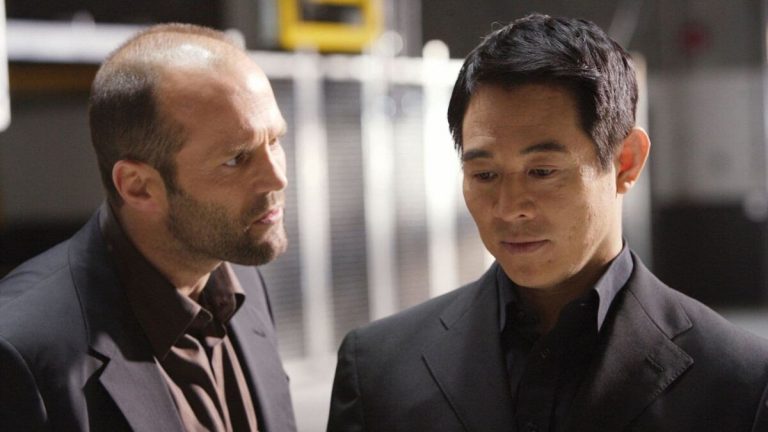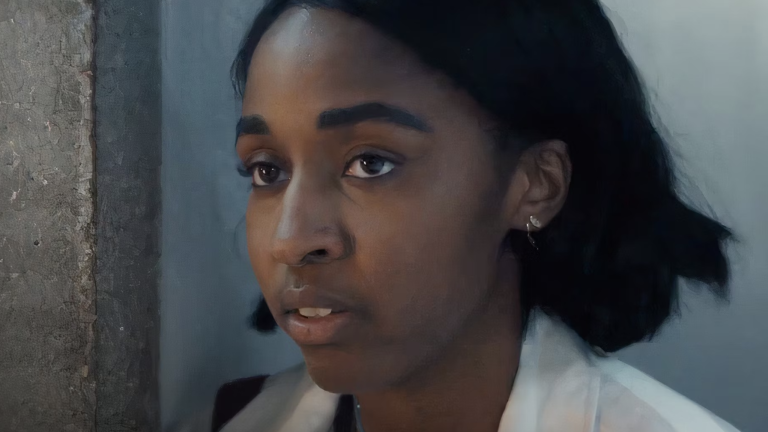Based on the true story of Brian Brown Easley’s unfortunate fate, Breaking (2022) emerges as a bank heist and soon turns into a tragedy guised in the veil of a thriller. The film exhibits an ex-marine’s cry for help through the vision of writer/director Abi Damaris Corbin and touches, if not dives straight into, several highly sensitive and bravely political matters of relevance. John Boyega’s phenomenal commitment to representing a black man at the extremities of poverty caused by the American government that he had served loyally is an incredibly distressing experience to witness. The justified predictability of the story is often inducive of a subconscious prayer; please don’t let the inevitable happen.
Breaking (2022) Plot Summary & Movie Synopsis
A note containing “I have a bomb” is passed during a seemingly pleasant conversation between bank employee Rosa (Selenis Leyva) and ex-marine Brian (John Boyega), and the course of the tone is set. Pertaining to the negligence and the duplicity of the Veterans Administration, Brian is on the brink of homelessness post his honorable discharge from the military. Everything about him indicates that he is a decent, mild-mannered guy who has reached his breaking point after being thrown on the floor and handcuffed at the VA office when all he wants is the money he’s owed. What disturbs him even more than his impending homelessness is his inability to give his daughter the life she deserves.
The quiet beginning of the hostage situation at the bank sees its real, terrifying face in Rosa’s immediate panic, and manager Estel’s (Nicole Beharie) prompt action of getting all the civilians out. Brian assures them that all they have to do is call the police and the news networks, as he needs the reality of the situation to reach as many people as it can. The suicidal mission of getting his money seems to be prompted by a PTSD episode fueled even further by his obsession with truth.
Despite the obvious seriousness of the circumstances, Brian’s empathetic nature seeps out through the constant heartfelt reassurances and apologies that he was offering the two hostages. The incompetence of the police department causes things to escalate into further panic and fear, and him having to hear the much-triggering phrase “Hold on.” After realizing that he needs to take charge if he wants his word out, Brian calls Lisa Larson (Connie Britton) of WSB tv and hopes for a realistic portrayal of him on the news while he waits for the police negotiator to arrive. Unable to provide him with facetime on tv, Lisa does her best to keep him engaged until he can talk to the negotiator.

Sergeant Eli Bernard (Michael K Williams) calls Brian hoping to convince him to let the hostages go. There’s a shift in the usual negotiator-hostage taker dynamic when ex-marine Eli also learns about Brian’s hardships since his discharge and realizes that his intention isn’t to harm the hostages at all. There’s an unstated understanding of the shared racial discrimination the two are facing; one in the form of inevitable death as a black criminal and another in the form of disrespect from his subordinate. All Brian wants is the amount that the VA owes him and for the country to know how poorly the people who serve it are treated. Eli’s frustration is genuine when he’s unable to help Brian due to systemic incompetence.
When Brian finally manages to get in touch with his ex-wife, it takes her a while to come to terms with the reality of the situation, and that provides another testament to his usual good nature. He treats Rosa and Estel with nothing but the utmost respect, trusts them to be alone, and promises them that the only death that will occur will be his. Brian’s high morals and stubbornness don’t allow him to take the money that Estel offers him from her genuine concern for his well-being.
Eli’s success in convincing Brian to let one hostage go in exchange for a pack of Newport cigarettes provides an opportunity for Rosa and Estel’s goodness to come out as neither wants freedom leaving another behind. They don’t even want Brian to meet death. The lack of active interference or efforts towards resolving the horrific situation is perhaps even more tension-inducing than the time Brian is seen erratically waving the remote to threaten an explosion.
Breaking (2022) Movie Review
Corbin’s treatment of Brian’s tragedy is sure to evoke sympathy, but the melodramatic storytelling squeezes out every possibility of a sad aspect and ends up trivializing it to some extent. The assisted, almost commanding manner of dramatizing it with cued dialogues ruins the natural emergence of feelings. The second-hand misery the audience is supposed to feel is too spoonfed to feel genuine. The tension of the circumstances was well delivered, and the great character writing almost brings the film close to its goal.
Breaking (2022), however, falls under the must-watch category for John Boyega’s incredible performance itself. His near-flawless performance is the only thing that does justice to his dreadful emotional turmoil of Brian. Every instance of the war going on within Brian is brilliantly exposed in Boyega’s body language. Michael K. Williams also does a phenomenal job in the final performance of his career and, sadly, his life.
The characters of Rosa and Estel were smart additions to the story as the world needed to know how two people on the edge of danger would feel for someone in Brian’s position. Any possibility of misinterpreting Brian’s intentions was averted through the outcome of the time he spent locked up in the bank with them. While the intention of the interactions between Brian and his daughter was also the same, in this case, the discomfort lies in the overly dramatized, forcibly emotional writing that did not feel real. Perhaps the movie would have succeeded in its endeavor had it been a one-location setting, and the eyes weren’t diverted so much from Brian.
Breaking (2022): Ending Explained
Did Brian receive what he was owed?
Brian’s fate was decided the moment he set foot in the bank. There’s no going back from a decision that extreme. His motive isn’t just driven by the VA money but mainly by his persistent urge to open the eyes of his countrymen to the unfortunate conclusions the people who serve the country end up facing.
Eli and Brian’s bond is that of trust and mutual understanding strengthened by a similar shared past and their experiences with discrimination. A friendly conversation between the two convinces Brian to let go of one of the hostages in exchange for a pack of cigarettes. Despite still not receiving the money, Brian agrees to the deal simply out of the goodness of his heart. His death is certain as he’s aware of how the police treat black criminals.
Another warm example of kindness is exhibited in the form of Rosa and Estel, unwilling to leave one another behind. Brian’s naivety and inexperience with criminal activities are evident when he leaves the two alone and goes to the bathroom to speak to his daughter. Their phone call carries the gloomy tone of goodbye in the form of shared comfort, reassurances, his emotional breakdown, and the reading of a Bible verse. Even in a dire situation, Brian does not let go of his fatherly duties and ensures that his daughter is okay.
Estel’s expected action of taking charge of the situation and trying to convince Rosa to escape fails as she stays for Rosa, who is too panicked to move a muscle. Estel’s fearless functionality in the face of a crisis, in contrast to Rosa’s absolutely panicked yet steady state, is interesting to observe, along with the acknowledgment of the goodness the two women possess.
Also, Read – Here’s Where Stream John Boyega’s ‘Breaking’ Online
In a moment of relative calmness, a shot fired by a sniper, the blood on Rosa’s clothes, and Estel’s panicked state foretell the feared outcome. Brian is shot to death, and the painful knowledge of him still not receiving the money lingers as horrified Rosa and Estel are carried out of the bank. The shock on Eli’s face suggests that he had led himself to believe in the word he gave to Brian. The FBI agents are made aware of what has transpired, and instead of comforting his ex-wife and daughter, they leave them in a pit of dreadful confusion despite all the pleading. As the baffled little girl looks out the window at her mother, hoping for some clarity, all the people at the crime scene are also left without a clear answer.
Unsurprisingly, no bomb is found in the backpack that is retrieved from Brian’s lifeless body. His intention was never to hurt anyone other than himself, and he knew that the bomb scare itself would draw enough attention without actually putting civilians in harm’s way. There’s a disturbing sense of comfort when the packet of Newport cigarettes and Brian’s cross find a place in Eli’s home, where he’ll be remembered as a martyr.
The real Brian’s 911 call is heard at the movie’s end. We learn that his family is yet to receive the money. Only half of Brian’s wishes came true. The world heard his side. Only conscious denial to justify a tragedy that can make sense of such a grand sacrifice for an outcome that did not result in any change whatsoever. The system kicked and punched a broken man, made him feel worthless, as his statement in the movie suggests, and ultimately pushed him to commit suicide.






